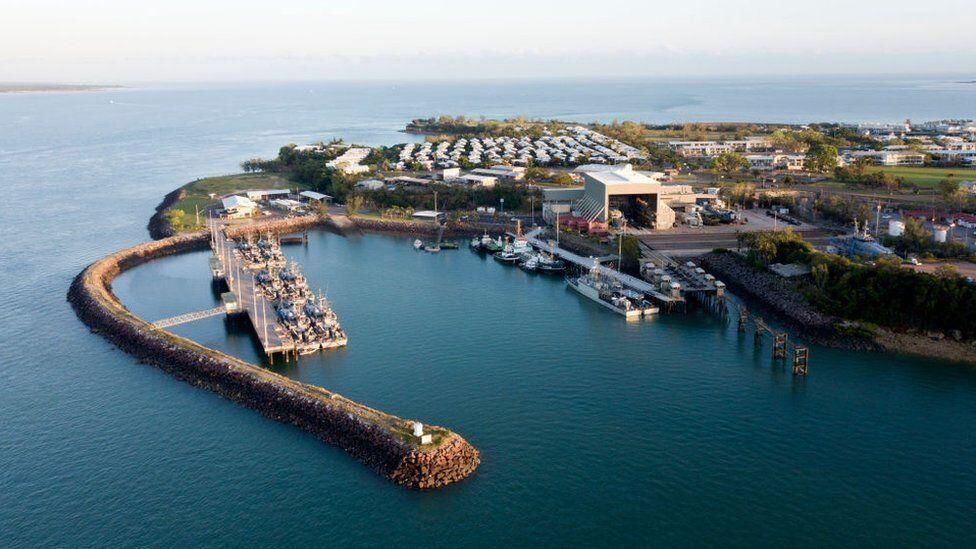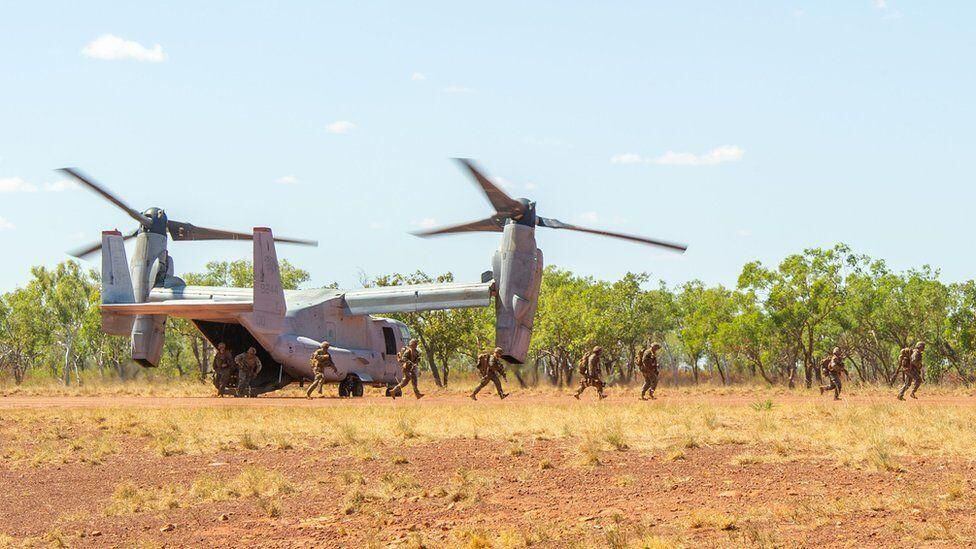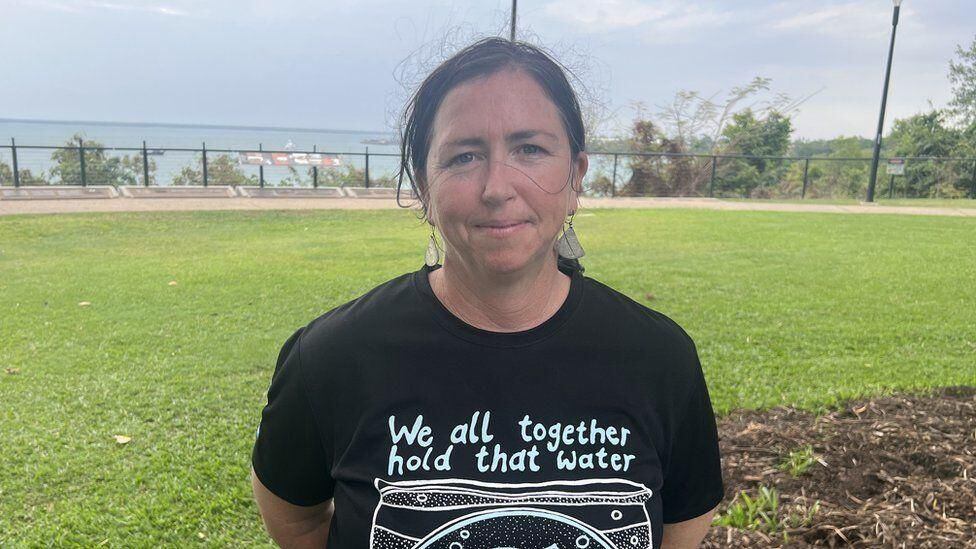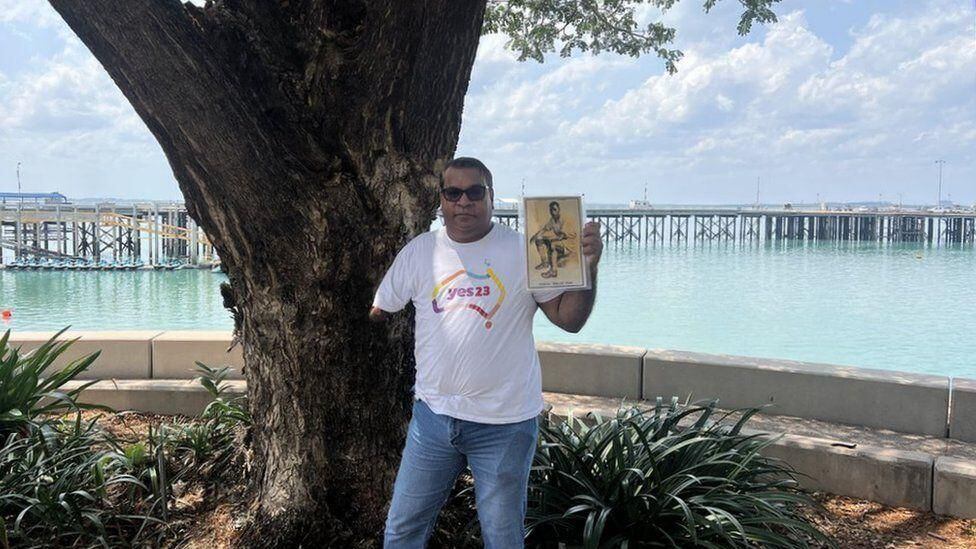Dissuade one China increasingly expansionist was one of the priorities of the meeting held on Wednesday by the Prime Minister of AustraliaAnthony Albanese and US President Joe Biden.
In Darwina city of around 140 thousand inhabitants that is fundamental to the pacific defense alliance led by the United States, the meeting was closely watched.
LOOK: 100 years since the creation of Turkey: how the Ottoman Empire fell, the superpower that survived 6 centuries and wanted to be universal
War first reached the shores of Australia Thursday morning in 1942 with the arrival of 188 Japanese aircraft in the center of this city.
Bombs rained down on the coast, kicking up red sand and engulfing its harbor with turquoise waters in smoke and fire.
The city was practically devastated after two air strikes that killed at least 230 people.
That February 19, when the first of around 200 attacks on northern Australia during the war took place, was the deadliest attack in the country’s history to date.
Eight decades later, Darwin is a peaceful holiday resort with almost no visible scars of war.
However, there are latent fears that this city will once again be in the spotlight in the event of a global conflict.
Darwin, home to important military bases that could play a crucial role in the event of war with China, occupies a central place in the increasingly close ties between Canberra and Washington, and is also the focus of massive investment by both governments.
But while US support comforts those who distrust Beijing, is there any alarm among those who fear their home will become a target.
“They are inviting conflict,” protests resident Billee McGinley, a member of the local advocacy group Top End Peace Alliance. A few days ago the group met to share their concerns in the shadow of the Cenotaph, a monument to those who fell in the war that devastated the city.
“We feel like a sacrificial offering,” he protests.
The far north
Darwin It has long been a military town. Although the crossing only takes 15 minutes, houses two bases of the army and a third is located on its outskirts.
Here it is more common to see someone in a military uniform than in a suit and the roar of planes above our heads is part of everyday life here.

Military families make up a large part of the population, not including the thousands of international soldiers who arrive every year for training and war exercises. And even greater is the proportion of the defense industry in the economy.
And it is clear that the military’s footprint in the so-called “far north” of the country will only grow.
Australia has argued in the past that it does not need to choose between the United States and China. But that calculation has changed.
Ties between Washington and Beijing have deteriorated and the latter’s claims to the South China Sea and Taiwan have become more expansive and threatening.
For this reason, Canberra claims to have regained its leadership role in ensuring security and stability in the region, with new commitments to allies and a massive review of its defense spending.
“If we look at a map, Darwin’s strategic importance is obvious,” says defense analyst Michael Shoebridge.
The Australian government announced that will send hundreds more soldiers to Darwin and other northern citiesand also promised that a large part of its new defense budget will go towards strengthening this region.
And while the United States has historically focused on Guam, Hawaii or Okinawa, it is now also pumping money into Australia.
The Pine Gap spy base on the outskirts of Alice Springs in central Australia is now open year-round, and since 2011 annual rotations of US Marines (this year around 2,500) have arrived in the Northern Territory, where Darwin is located.
In recent years, Washington has committed to assigning some $2 billion for base improvements and new facilities.
In Darwin this includes a mission planning and operations center and 11 aircraft fuel storage tanks, while at Tindal air base, a few hours south, hangars for nuclear-capable bombers and a huge bunker will be built.
Australia and the United States have also signed bilateral defense agreements and increasing military cooperation was high on the agenda for Albanese’s trip to Washington.

Experts believe that both countries’ military buildup in Australia’s far north aims to spread resources and risks across the region to “complicate” any Beijing war strategy.
However, it is above all about preventing war.
“It is obvious that neither diplomacy nor all the forums and meetings that exist in the region prevent China’s aggression and intimidation,” says Shoebridge.
And he adds: “to deter the conflict, there needs to be sufficient force that is not in the hands of China, so that Beijing understands that the cost of the conflict would be too high. No collective defense strategy makes sense in our region without the “U.S. Participation.”
In the spotlight
But it worries some Darwin residents.
While there are different opinions about the likelihood of a conflict with China, they are concerned that the defensive buildup will not deter Beijing but increase tensions.
They fear that the American presence in Darwin could push Australia into a war that doesn’t concern it and make their city a target.
“If we position ourselves as neutral and peaceful, it would be a war crime to come here,” McGinley says.
He is so worried about Darwin’s future that he reconsiders his family’s future in the city: “with a young daughter, I’m thinking about whether to stay here or not.”
There are also more immediate problems. In recent months, a US Marine was charged with rape and a US Osprey helicopter crashed and exploded near a school.
And it also takes into account the impact that these expanding bases – and any potential attacks – could have on Aboriginal cultural heritage and the natural beauty for which the Northern Territory is known.
Because there are so few people living in this region, they are treated as “expendable,” says Diana Rickard, director of the Top End Peace Alliance.
“These were always considered vacant lots… and they still are,” he says.

Naish Gawen, another resident, complains that “the risks, impacts and threats are externalized to the people who live here, but any possible benefits are for people elsewhere”.
The Alliance for Peace regrets that its concerns do not seem to resonate with the community or receive attention from authorities.
In fact, when walking through Darwin you notice a general atmosphere of indifference in the face of military presence.
“It’s not something I’ve heard much about,” says Brianna, a 30-year-old local resident.
The local business chamber and politicians from both major Australian parties highlight the economic benefits of defense investments.
Northern Territory Chief Minister Natasha Fyles and Australian Defense Minister Richard Marles did not respond to the BBC’s request for comment. Marles has previously stated that Darwin is an “important” national “asset”, which is “good news for the Territory’s economy”.
“It’s essential that we leave our mark here,” he said in April.
However, experts do not rule out the possibility of Darwin becoming a military target.
Defense strategist Becca Wasser has spent years predicting what could happen in the event of a conflict in the region. In most simulated scenarios, China attempts to attack Australia with missiles.
But its success is limited, considering the technology that Beijing and the more than 4,000 kilometers that separate mainland China and Australia.
“In fact, most missiles would not even reach the northernmost bases,” he says.
But it is not the existence of the bases that makes Darwin a target, he emphasizes. The key factor is whether Australia uses them to send troops.
Australia has joined almost every coalition operation the United States has fought in in recent years, the expert adds, but that’s no guarantee the country will decide to join future wars.
“The decision to contribute forces to any conflict is a political decision and it is a decision that Australia makes for itself. It’s not something that can simply be determined by the United States,” she explains.

Even those whose families survived the bombing of Darwin in 1942 seem to accept the city’s new military reality.
Richard Fejo tells stories passed down to him by his grandfather, Juma Fejo, and his great-uncle Samuel Fejo. The oldest member of the Larrakia ethnic group guarantees that his family members never recovered from the loss of human life they witnessed or the impact on their ancestral home.
“In Aboriginal culture we say the earth is our mother; and that’s why something as terrible as the bombing of Darwin, for the people of Larrakeyah was like sticking a knife in their hearts,” he says.
Although he feels intimidated by the prospect of war returning to his home, he says he considers himself a “realist”.
“These people who protest and argue about the presence of Americans on the lands of Larrakia, what option do they offer us? We must remember our past, but we must also be prepared for the future,” she says.
Source: Elcomercio
I am Jack Morton and I work in 24 News Recorder. I mostly cover world news and I have also authored 24 news recorder. I find this work highly interesting and it allows me to keep up with current events happening around the world.

:quality(75)/cloudfront-us-east-1.images.arcpublishing.com/elcomercio/4NPJMTEI4FGNFPWE6EZY3UYYQQ.jpg)

:quality(75)/cloudfront-us-east-1.images.arcpublishing.com/elcomercio/SB5UJJHKCRAPBMQHJUTR6FAPRI.jpg)
:quality(75)/cloudfront-us-east-1.images.arcpublishing.com/elcomercio/XNOKD2RVMNBYNASZE2DHNLO3BA.jpg)
:quality(75)/cloudfront-us-east-1.images.arcpublishing.com/elcomercio/3SE4EY4IH5GQROHWEIYF2A4RLE.jpg)
:quality(75)/cloudfront-us-east-1.images.arcpublishing.com/elcomercio/WRZ5I5NEY5CBXIRMEER3MSUEDQ.jpg)
